So another year has come and will shortly pass away into memory. What sort of year has it been in Smitty's World? Let's recap, shall we?
In January, we talked about an exciting upcoming deployment, to Basra, in Iraq. That did not pan out, and though I was a bit disappointed at the time I'm glad it didn't. I had hoped, in January, that if the deployment went off I'd be home in early June and would be out of the service very shortly thereafter. See what that gets you...
Also in January, we discussed the need to buy Danish, the rudeness of modern technology, and we were first introduced to Taylor Hicks for the first time on American Idol.
In February, I had a great bottle of wine, which was occasioned by my acceptance to UVA Law. I had hoped to be enrolled there in classes now. That was also the day that Tampa got something like 11 inches of rain. Back in them days I was planning a fun August trip to Nebraska for a friend's wedding and the Nebraska Hedonism Tour, but that never panned out. I'm still looking for an excuse to take the tour. I went back to Valdosta, where I did pilot training, and was disappointed at the results. I did some soul searching, already apparently wondering whether law school was the right thing or not, but didn't come to any great conclusions. Dick Cheney gave in to bloodlust, we had the Olympics, saw a picture of the future, and talked about the major league sports market. Sort of a schizophrenic month.
March saw me off to the Everglades for a wonderful vacation. March also marked the famous polemics about trees, wherein I attempted to provide a list of 100 native Florida trees you can plant instead of oaks (to which I am, particularly in March, allergic). Then I went off on the Chinese Stinking Pear (also called the "Bradford Pear") and provided photos of twelve attractive native flowering plants that are better. I also got to fly again, for the first time in a year, and it was pure bliss. Although I spent part of the month laid out with back pain, March was a good month.
April provided the first inkling of an opportunity to go to Djibouti, to deploy again for the first time in a year and feel like I was actually contributing to the war effort, misguided though it may be. I went off to a wedding, attempted but did not make a solo flight to Atlanta, and managed to finish the worst book I read all year, I am Charlotte Simmons. I also turned… um… an age. Yes.
May was a wonderful glorious month, for in May I met Smittygirl. I also spent a week at the cabin in North Carolina, did tons of writing, went on some cool hikes with Lucky Bob and Rambling, and went to a friend's wedding. I had a great time at a rave, and finished the best book I read all year, Straight Man--although that's not quite fair, since I'd read it once before.
June was apparently very dull. I'm sure there were some interesting politics-related posts or something, but as you can see, I had nothing to say in June.
July was a fine month. Although it started well, with guests in town for the Fourth and such, the middle part was lousy, with my departure for Djibouti. But it finished great when, on the 29th, I finally finished Lauderdale.
August is a complete wash. I can't remember it. I lived in a tent. I worked out some. I reviewed, but had long since finished reading, A Walk in the Woods, the best non-fiction book of the year. I went out into the countryside of Djibouti to see some cheetahs. That's about it. August was a wash.
September… hmm, yes, September. Yes, well. I moved into a CLU out there in Djibouti, but that post is not on the blog at present. It was a happy day, but frankly, I don't think well of much of Djibouti anymore. The only significant thing to happen that month was that I made the decision to attend Burning Man in 2007. I hope this works out but I'm not sure. I am buying tickets though, on the 17th, so if you think you might perhaps possibly consider thinking about maybe going, let me know and I'll get one for you. You can sell the things on eBay or Craig's List so it's not a big if you get a ticket and then can't go.
October is usually such a wonderful month. It is. Usually. I don't even want to talk about it. I did read the best fiction book of the year that I had not read before. That was something. It was a rough month, though, precipitating as it did the removal of almost half the posts on this blog, and several other things best left in the ground. I had to say goodbye to Cinders in October, as it became apparent he would not be around when I returned. Probably the hardest thing I did all year.
November was a substantial improvement over October. We had an election, which was pretty cool. I finally solved the monthslong dilemma of Conocarpus lancifolius. I began work on (but in no way completed) a quirky novel about superheroes or something. And I went on a wonderful safari with some terrific people. Had a great time. Almost made the whole deployment worth it. Almost.
In December, bless the Lord, I came home. Smittygirl was waiting for me at the airport. It was wonderful. I paid off my car, celebrated a wedding and a reunion at the same time, celebrated Christmas, and now here I am, on the 1st, recapping what was ultimately a rather crappy year.
I dated this post for 2359 last night, although I didn't write it then. Duh! I was watching fireworks and stuff. But it seemed like a post that should be in 2006.
So what would I say about the year that's passed? Well. I don't wish to be negative. I did meet Smittygirl, after all. I said goodbye to a good friend, too. I read some good books and some lousy ones, wrote a mediocre one, went on some great trips, worked an incredibly pointless job in a dirty, unpleasant country, made some decent money, and paid off my car (it's really exciting!). We crowned an interesting new American Idol, saw some great displays of athleticism at the Olympics, and had an interesting election. We lost some good people, and some bad ones. On balance it wasn't the worst year I've ever passed.
Hmm. You know, if it wasn't, I don't know which one was. Here's to 2006. May it rest in pieces.
31 December 2006
30 December 2006
Safari Post III
When last we spoke of Safari, I was still staying at the Safari Park Hotel in Nairobi. Well, we couldn't very well stay there all week, so off we went one morning on one of the numerous taxicabs, deep into darkest downtown Nairobi. There is a large intercity bus station there, but we ended up on some cross street swarmed with jitneys, jalopies, and other things that start with J, not to mention hordes, throngs, and milling thousands of people. Of course, on our way there we had a flat tire and had to watch the milling thousands pass by us in their diesel-belching jitneys and jalopies, but once we arrived safely in the midst of the horde we left our cabbie behind and hopped on board the Riverside Shuttle, a 26-seat bus complete with rooftop luggage rack. Remember that it had been raining off and on since we arrived in Nairobi, so I was none to happy about leaving my luggage on the roof, but there was no room inside; by the time we left, 29 of the 26 seats were occupied. You read me.
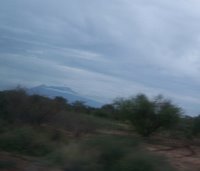 On our way south to the city of Arusha, in Tanzania, I took this beautiful picture of a mountain that is not Mt. Kilimanjaro. It was on the other side of the bus, as it turns out. Not that anybody saw it. The road to Arusha--shown in dark blue on our maps of the area, the equivalent of I-40 or the M4--was a 1.5 lane jostle-o-matic massage with purely theoretical paving but only occaisonal intrusions by poultry and livestock (not to mention the people). We were never so happy to see a hotel as we were when we finally pulled up, some six hours later at around eight in the evening, at the Impala Hotel in beautiful Arusha.
On our way south to the city of Arusha, in Tanzania, I took this beautiful picture of a mountain that is not Mt. Kilimanjaro. It was on the other side of the bus, as it turns out. Not that anybody saw it. The road to Arusha--shown in dark blue on our maps of the area, the equivalent of I-40 or the M4--was a 1.5 lane jostle-o-matic massage with purely theoretical paving but only occaisonal intrusions by poultry and livestock (not to mention the people). We were never so happy to see a hotel as we were when we finally pulled up, some six hours later at around eight in the evening, at the Impala Hotel in beautiful Arusha.
The Impala bills itself as "the only four star hotel in Arusha." They are exaggerating, or else the Arusha Chamber of Commerce has created a new grading system. Nonetheless, if you go to Arusha, you should stay at the Impala. It is not the nicest hotel in town--we stayed at the New Arusha Tourist Hotel on our return from safari, and the rooms there were much more luxurious--but it has four terrific restaurants on premises and a pool and you would do well to stay here lest you suffer the cooking at the New Arusha Tourist Hotel (and suffer you shall).
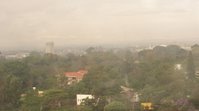 In the morning I took the elevator to the top of the hotel and snapped this shot of the city of Arusha, such as it is. Arusha has about 150,000 people, by the Tanzanian government's definition (which may and probably does include vast swaths of the surrounding countryside), but it is the point of embarkation for at least three quarters of safaris to the Serengeti, Tarangire, and elsewhere in northern Tanzania. It is fairly smoggy, but all in all we agreed Arusha was much the nicer city than Nairobi, on the whole. The city is dominated by Mt. Meru, which you can also see from the top floor of the hotel.
In the morning I took the elevator to the top of the hotel and snapped this shot of the city of Arusha, such as it is. Arusha has about 150,000 people, by the Tanzanian government's definition (which may and probably does include vast swaths of the surrounding countryside), but it is the point of embarkation for at least three quarters of safaris to the Serengeti, Tarangire, and elsewhere in northern Tanzania. It is fairly smoggy, but all in all we agreed Arusha was much the nicer city than Nairobi, on the whole. The city is dominated by Mt. Meru, which you can also see from the top floor of the hotel.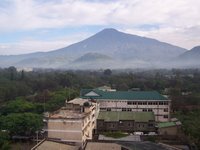
In the morning we headed into town to visit Sunny Safaris, who had planned our safari. I highly, highly recommend Sunny Safaris if you are considering a safari. If you want the full luxury safari with stays at Serena Lodges every night and so forth, you'll want to go with someone else, but if like us you have a budget to work with Sunny is the place to be.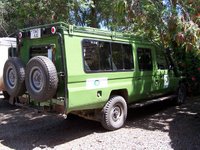 We met our driver, Bryson (who appears in only one of my pictures and I am quite annoyed about that and need to get a picture from one of my traveling companions), and took a seat in our chariot for the week, a massive nine-passenger Toyota Land Cruiser. Sweet ride.
We met our driver, Bryson (who appears in only one of my pictures and I am quite annoyed about that and need to get a picture from one of my traveling companions), and took a seat in our chariot for the week, a massive nine-passenger Toyota Land Cruiser. Sweet ride.
We stopped at a convenience store of sorts, to stock up on goodies. You get the feeling that Sunny and this place have an agreement and everybody stops here on their way out of town on safari. The place was stocked with every conceivable kind of liquor, plus chips, candy, and sodas, and a variety of other things. We bought some beers and cider, and several bags of Chili-Lemon chips, which turned out to be absolutely great and I'm kinda craving some right now.
On our way out of town we passed the various sites. For example, there was this coffee plantation. Believe it or not, the air smelled vaguely of coffee. (There were no tea plantations that I saw, but all week I drank plenty of good Kenyan tea.) Later, we passed the Arusha International Airport. No, really. You can catch a commercial flight into this from Dar es Salaam or Nairobi, or several other cities in Tanzania. What fun that would be.
 Much later--it's a four hour drive to Mto wa Mbu and the first national park you visit--we passed by this traditional Maasai village.
Much later--it's a four hour drive to Mto wa Mbu and the first national park you visit--we passed by this traditional Maasai village.
Finally you come through Mto wa Mbu, and head to Lake Manyara National Park. That's where we'll pick up next time; here's a photo of the national park to tide you over. There are actual animals in the park! And I'm through building suspense; next time we'll see elephants, giraffes, and all sorts of cool things!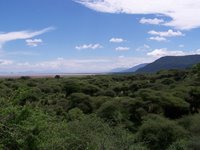
Safari Post I (Introduction)
Safari Post II (Nairobi)
Safari Post III (Arusha – The Safari Begins)
Safari Post IV - Lake Manyara A
Safari Post V - Lake Manyara B
Safari Post VI - Lake Manyara Lodge
Safari Post VII - Off to Serengeti!
 On our way south to the city of Arusha, in Tanzania, I took this beautiful picture of a mountain that is not Mt. Kilimanjaro. It was on the other side of the bus, as it turns out. Not that anybody saw it. The road to Arusha--shown in dark blue on our maps of the area, the equivalent of I-40 or the M4--was a 1.5 lane jostle-o-matic massage with purely theoretical paving but only occaisonal intrusions by poultry and livestock (not to mention the people). We were never so happy to see a hotel as we were when we finally pulled up, some six hours later at around eight in the evening, at the Impala Hotel in beautiful Arusha.
On our way south to the city of Arusha, in Tanzania, I took this beautiful picture of a mountain that is not Mt. Kilimanjaro. It was on the other side of the bus, as it turns out. Not that anybody saw it. The road to Arusha--shown in dark blue on our maps of the area, the equivalent of I-40 or the M4--was a 1.5 lane jostle-o-matic massage with purely theoretical paving but only occaisonal intrusions by poultry and livestock (not to mention the people). We were never so happy to see a hotel as we were when we finally pulled up, some six hours later at around eight in the evening, at the Impala Hotel in beautiful Arusha.The Impala bills itself as "the only four star hotel in Arusha." They are exaggerating, or else the Arusha Chamber of Commerce has created a new grading system. Nonetheless, if you go to Arusha, you should stay at the Impala. It is not the nicest hotel in town--we stayed at the New Arusha Tourist Hotel on our return from safari, and the rooms there were much more luxurious--but it has four terrific restaurants on premises and a pool and you would do well to stay here lest you suffer the cooking at the New Arusha Tourist Hotel (and suffer you shall).
 In the morning I took the elevator to the top of the hotel and snapped this shot of the city of Arusha, such as it is. Arusha has about 150,000 people, by the Tanzanian government's definition (which may and probably does include vast swaths of the surrounding countryside), but it is the point of embarkation for at least three quarters of safaris to the Serengeti, Tarangire, and elsewhere in northern Tanzania. It is fairly smoggy, but all in all we agreed Arusha was much the nicer city than Nairobi, on the whole. The city is dominated by Mt. Meru, which you can also see from the top floor of the hotel.
In the morning I took the elevator to the top of the hotel and snapped this shot of the city of Arusha, such as it is. Arusha has about 150,000 people, by the Tanzanian government's definition (which may and probably does include vast swaths of the surrounding countryside), but it is the point of embarkation for at least three quarters of safaris to the Serengeti, Tarangire, and elsewhere in northern Tanzania. It is fairly smoggy, but all in all we agreed Arusha was much the nicer city than Nairobi, on the whole. The city is dominated by Mt. Meru, which you can also see from the top floor of the hotel.
In the morning we headed into town to visit Sunny Safaris, who had planned our safari. I highly, highly recommend Sunny Safaris if you are considering a safari. If you want the full luxury safari with stays at Serena Lodges every night and so forth, you'll want to go with someone else, but if like us you have a budget to work with Sunny is the place to be.
 We met our driver, Bryson (who appears in only one of my pictures and I am quite annoyed about that and need to get a picture from one of my traveling companions), and took a seat in our chariot for the week, a massive nine-passenger Toyota Land Cruiser. Sweet ride.
We met our driver, Bryson (who appears in only one of my pictures and I am quite annoyed about that and need to get a picture from one of my traveling companions), and took a seat in our chariot for the week, a massive nine-passenger Toyota Land Cruiser. Sweet ride.We stopped at a convenience store of sorts, to stock up on goodies. You get the feeling that Sunny and this place have an agreement and everybody stops here on their way out of town on safari. The place was stocked with every conceivable kind of liquor, plus chips, candy, and sodas, and a variety of other things. We bought some beers and cider, and several bags of Chili-Lemon chips, which turned out to be absolutely great and I'm kinda craving some right now.

On our way out of town we passed the various sites. For example, there was this coffee plantation. Believe it or not, the air smelled vaguely of coffee. (There were no tea plantations that I saw, but all week I drank plenty of good Kenyan tea.) Later, we passed the Arusha International Airport. No, really. You can catch a commercial flight into this from Dar es Salaam or Nairobi, or several other cities in Tanzania. What fun that would be.

 Much later--it's a four hour drive to Mto wa Mbu and the first national park you visit--we passed by this traditional Maasai village.
Much later--it's a four hour drive to Mto wa Mbu and the first national park you visit--we passed by this traditional Maasai village.Finally you come through Mto wa Mbu, and head to Lake Manyara National Park. That's where we'll pick up next time; here's a photo of the national park to tide you over. There are actual animals in the park! And I'm through building suspense; next time we'll see elephants, giraffes, and all sorts of cool things!

Safari Post I (Introduction)
Safari Post II (Nairobi)
Safari Post III (Arusha – The Safari Begins)
Safari Post IV - Lake Manyara A
Safari Post V - Lake Manyara B
Safari Post VI - Lake Manyara Lodge
Safari Post VII - Off to Serengeti!
Knight Life
 I finished Peter David's Knight Life and One Knight Only while on safari. These had been mailed to me by the incomparable Lucky Bob, who has already reviewed both of them. His reviews are better, so the links above just send you straight over to him for the full story. Suffice to say I enjoyed both of these, as you might suspect being sort of a political junkie with a slight affinity for the truth. The notion of King Arthur returning in the present day to run for office and what that might entail… it's a gold mine.
I finished Peter David's Knight Life and One Knight Only while on safari. These had been mailed to me by the incomparable Lucky Bob, who has already reviewed both of them. His reviews are better, so the links above just send you straight over to him for the full story. Suffice to say I enjoyed both of these, as you might suspect being sort of a political junkie with a slight affinity for the truth. The notion of King Arthur returning in the present day to run for office and what that might entail… it's a gold mine. I will say that, Peter David being a fantasy writer and not a political writer, the books—in particular One Knight Only, tended much more toward fantasy than political fiction usually does. Had I written them they would have gone off in an entirely different direction, and readers like me who don't do a lot of fantasy literature might wish Mr. David had spent more time considering how King Arthur reacts to modern politics and less time on the dirty doings of Morgan le Fey and Gilgamesh. But that's just me. I still had a good time.
I will say that, Peter David being a fantasy writer and not a political writer, the books—in particular One Knight Only, tended much more toward fantasy than political fiction usually does. Had I written them they would have gone off in an entirely different direction, and readers like me who don't do a lot of fantasy literature might wish Mr. David had spent more time considering how King Arthur reacts to modern politics and less time on the dirty doings of Morgan le Fey and Gilgamesh. But that's just me. I still had a good time.
Knight Life
 I finished Peter David's Knight Life and One Knight Only while on safari. These had been mailed to me by the incomparable Lucky Bob, who has already reviewed both of them. His reviews are better, so the links above just send you straight over to him for the full story. Suffice to say I enjoyed both of these, as you might suspect being sort of a political junkie with a slight affinity for the truth. The notion of King Arthur returning in the present day to run for office and what that might entail… it's a gold mine.
I finished Peter David's Knight Life and One Knight Only while on safari. These had been mailed to me by the incomparable Lucky Bob, who has already reviewed both of them. His reviews are better, so the links above just send you straight over to him for the full story. Suffice to say I enjoyed both of these, as you might suspect being sort of a political junkie with a slight affinity for the truth. The notion of King Arthur returning in the present day to run for office and what that might entail… it's a gold mine. I will say that, Peter David being a fantasy writer and not a political writer, the books—in particular One Knight Only, tended much more toward fantasy than political fiction usually does. Had I written them they would have gone off in an entirely different direction, and readers like me who don't do a lot of fantasy literature might wish Mr. David had spent more time considering how King Arthur reacts to modern politics and less time on the dirty doings of Morgan le Fey and Gilgamesh. But that's just me. I still had a good time.
I will say that, Peter David being a fantasy writer and not a political writer, the books—in particular One Knight Only, tended much more toward fantasy than political fiction usually does. Had I written them they would have gone off in an entirely different direction, and readers like me who don't do a lot of fantasy literature might wish Mr. David had spent more time considering how King Arthur reacts to modern politics and less time on the dirty doings of Morgan le Fey and Gilgamesh. But that's just me. I still had a good time.
River of Grass
 I finished this book in November the day before the safari. Like Some Kind of Paradise, this is a book about Florida history—at least to some degree. Published in 1947, this is really the original Florida history, the first important popular book about Florida to attempt any decent coverage of the pre-Columbian period. And it set the tone, in many ways, for every Florida history that was to follow, by drawing its narrative around the state's ecology.
I finished this book in November the day before the safari. Like Some Kind of Paradise, this is a book about Florida history—at least to some degree. Published in 1947, this is really the original Florida history, the first important popular book about Florida to attempt any decent coverage of the pre-Columbian period. And it set the tone, in many ways, for every Florida history that was to follow, by drawing its narrative around the state's ecology. Marjorie Stoneman Douglas was for many years after this book's publication regarded as the foremost Everglades scholar, historian, and protector, and she fought for Everglades restoration until her death a few years ago. River of Grass was not so much the end of a long studied interest in the Glades as it was the start of a career. The book also started a lot of other careers, got a lot of people in South Florida and elsewhere interested in the unique patch of ground we have at the end of this state and have been trying to destroy for two hundred years. For that alone the book deserves high honor.
But it was written in the 40's. New scholarship and new ideas have changed the way we think about some parts of the state's early history, and this can be jarring if you're up to date on what we now think about Ponce and the Calusa and everything else. But Douglas was the first writer to say in any popular format that Ponce de Leon was not, in fact, looking for the Fountain of Youth, and indeed may not have even known the myth. It was added later by Spanish romantics looking to idealize what was a brutal and difficult conquest (and one that didn't exactly pay off for Spain).
The first few chapters are about Glades ecology, and here it is clear Mrs. Douglas really knew and loved the Glades, had spent time in it and talked to the people who'd lived in it. And it's clear how important it was to her to make the Glades seem like more than some God-forsaken swamp at the end of the Earth, which for most people at that time it still was. Occasionally the prose is a bit florid, the description just a mite too romantic to be entirely real, but it's still wonderfully evocative.
After the first five chapters, Mrs. Douglas settles down into a linear narrative, something Some Kind of Paradise could have used a bit more of. She is a gifted storyteller, and that is the key requisite for a popular historian. Though River of Grass covered much of the same material I'd read just a few months earlier, I found this book a faster read, more like a story, less a witty retelling of facts than a gripping old-fashioned yarn. That's what popular history should be.
The book focuses exclusively on south Florida, south of Lake Okeechobee for the most part with occasional notes about goings on elsewhere in the state but nothing in-depth. For this reason it's not the best available history of the state, if that's what you're looking for. But it is hard to beat River of Grass for a good historical adventure, and you'll get a great insight for the Glades and the people who've sought to tame them.
River of Grass
 I finished this book in November the day before the safari. Like Some Kind of Paradise, this is a book about Florida history—at least to some degree. Published in 1947, this is really the original Florida history, the first important popular book about Florida to attempt any decent coverage of the pre-Columbian period. And it set the tone, in many ways, for every Florida history that was to follow, by drawing its narrative around the state's ecology.
I finished this book in November the day before the safari. Like Some Kind of Paradise, this is a book about Florida history—at least to some degree. Published in 1947, this is really the original Florida history, the first important popular book about Florida to attempt any decent coverage of the pre-Columbian period. And it set the tone, in many ways, for every Florida history that was to follow, by drawing its narrative around the state's ecology. Marjorie Stoneman Douglas was for many years after this book's publication regarded as the foremost Everglades scholar, historian, and protector, and she fought for Everglades restoration until her death a few years ago. River of Grass was not so much the end of a long studied interest in the Glades as it was the start of a career. The book also started a lot of other careers, got a lot of people in South Florida and elsewhere interested in the unique patch of ground we have at the end of this state and have been trying to destroy for two hundred years. For that alone the book deserves high honor.
But it was written in the 40's. New scholarship and new ideas have changed the way we think about some parts of the state's early history, and this can be jarring if you're up to date on what we now think about Ponce and the Calusa and everything else. But Douglas was the first writer to say in any popular format that Ponce de Leon was not, in fact, looking for the Fountain of Youth, and indeed may not have even known the myth. It was added later by Spanish romantics looking to idealize what was a brutal and difficult conquest (and one that didn't exactly pay off for Spain).
The first few chapters are about Glades ecology, and here it is clear Mrs. Douglas really knew and loved the Glades, had spent time in it and talked to the people who'd lived in it. And it's clear how important it was to her to make the Glades seem like more than some God-forsaken swamp at the end of the Earth, which for most people at that time it still was. Occasionally the prose is a bit florid, the description just a mite too romantic to be entirely real, but it's still wonderfully evocative.
After the first five chapters, Mrs. Douglas settles down into a linear narrative, something Some Kind of Paradise could have used a bit more of. She is a gifted storyteller, and that is the key requisite for a popular historian. Though River of Grass covered much of the same material I'd read just a few months earlier, I found this book a faster read, more like a story, less a witty retelling of facts than a gripping old-fashioned yarn. That's what popular history should be.
The book focuses exclusively on south Florida, south of Lake Okeechobee for the most part with occasional notes about goings on elsewhere in the state but nothing in-depth. For this reason it's not the best available history of the state, if that's what you're looking for. But it is hard to beat River of Grass for a good historical adventure, and you'll get a great insight for the Glades and the people who've sought to tame them.
29 December 2006
Punch Drunk Love
I have a serious question here. Smittygirl and I watched this movie, Punch Drunk Love, last night. Or, no, it was the night before (we watched Over the Hedge last night, which was much better).
Um... well. It was... well, I'm not going to say it was awful, but I didn't like it. I didn't really get it, much of the time. I didn't get how Barry was able to track down the sex talk people. I didn't get why Lena liked him... I mean, I didn't get that at all, he's a wackjob. I get that his sisters were domineering but is there NO ONE in Barry's life who can see them for what they are? It's absolutely absurd that everyone would think Barry was the only nutcase in that family. Although I will admit that accident/harmonium scene in the beginning is totally awesome and I like the way it sets up the story, sets up what is about to happen in Barry's life. It's very poetic.
And because of that scene I find myself thinking that it may, in fact, be a good film. I just don't care to ever watch it again and didn't really think it was especially entertaining. It was a lousy movie. But it might have been a good film. So, if anybody's seen Punch Drunk Love, please, I want to know what you thought of it and why.
Um... well. It was... well, I'm not going to say it was awful, but I didn't like it. I didn't really get it, much of the time. I didn't get how Barry was able to track down the sex talk people. I didn't get why Lena liked him... I mean, I didn't get that at all, he's a wackjob. I get that his sisters were domineering but is there NO ONE in Barry's life who can see them for what they are? It's absolutely absurd that everyone would think Barry was the only nutcase in that family. Although I will admit that accident/harmonium scene in the beginning is totally awesome and I like the way it sets up the story, sets up what is about to happen in Barry's life. It's very poetic.
And because of that scene I find myself thinking that it may, in fact, be a good film. I just don't care to ever watch it again and didn't really think it was especially entertaining. It was a lousy movie. But it might have been a good film. So, if anybody's seen Punch Drunk Love, please, I want to know what you thought of it and why.
Work Avoidance Policy
I'm supposed to be cleaning my house right now. I have several books to review, though. And... and I'm sure there are other things I could be doing to avoid work. But I shouldn't...
20 December 2006
Safari Post II
So we flew to Nairobi, in Kenya. Although there were cool giraffes outside the airport, I was not terribly impressed with Nairobi. It is a very big city and the infrastructure is generally fairly poor. There are some nice hotels; the best are self-contained worlds with everything you need under one roof (or at any rate within one walled compound), which is what you want because frankly Nairobi is large, busy, dense, dirty, and not terribly safe. But it's still better than Djibouti.
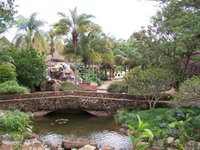 So we spent a couple nights at the Safari Park Hotel on the outskirts of town. It's a very nice place, although it is about a two hour drive from the airport at rush-hour in traffic that very nearly sits still the entire time. And oh, the aroma! Most of the traffic consists of these things that look like updated Volkswagen microbusses and spew exciting leaded diesel fumes.
So we spent a couple nights at the Safari Park Hotel on the outskirts of town. It's a very nice place, although it is about a two hour drive from the airport at rush-hour in traffic that very nearly sits still the entire time. And oh, the aroma! Most of the traffic consists of these things that look like updated Volkswagen microbusses and spew exciting leaded diesel fumes.
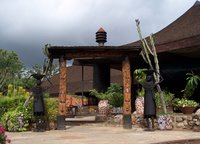 But the hotel was great. They had a terrific IThailian restaurant (Italian, but it sounded like the guy in the front office said "Thai" and we were all hungry for Thai the rest of the week), and a Japanese restaurant, and free breakfast with good tea, and a full hour massage for 1500 shillings--which is about $22. Not bad. And then there's this restaurant, the "African Barbecue" restaurant, where you can get dinner for $18 (including a bottle of wine!). What you get for that price is a salad, soup, and all the meat you can eat, to include goat, camel, and crocodile. The crocodile tastes like a whitefish filet with the consistency of a good ribeye. I couldn't get used to it and didn't eat much. The goat was excellent. The camel tasted wonderful but was chewy, like a clam strip. There were, of course, other meats, which were tasty, and a terrific (and extremely athletic) dance show. Without question this was the best thing we saw/did in Nairobi.
But the hotel was great. They had a terrific IThailian restaurant (Italian, but it sounded like the guy in the front office said "Thai" and we were all hungry for Thai the rest of the week), and a Japanese restaurant, and free breakfast with good tea, and a full hour massage for 1500 shillings--which is about $22. Not bad. And then there's this restaurant, the "African Barbecue" restaurant, where you can get dinner for $18 (including a bottle of wine!). What you get for that price is a salad, soup, and all the meat you can eat, to include goat, camel, and crocodile. The crocodile tastes like a whitefish filet with the consistency of a good ribeye. I couldn't get used to it and didn't eat much. The goat was excellent. The camel tasted wonderful but was chewy, like a clam strip. There were, of course, other meats, which were tasty, and a terrific (and extremely athletic) dance show. Without question this was the best thing we saw/did in Nairobi.
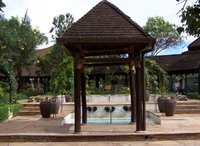 It was rainy most of the day when we were there, but after the massages my friend and I decided we should take a dip in the hot tubs anyway. The water comes out of these little elephants. It's rather nifty. Unfortunately, as you'd expect in a place where the outside air temperature rarely gets above 85 or below 60, the outdoor "hot tub" is more of a "warmish tub," especially after half an hour of rain. There's also a waterslide out of shot to the left; the water temperature was between "Oh my God!" and "Holy @$#$!", but I went down the slide anyway. Twice. The trees with the yellow flowers are Thevetia peruviana, two of which live in pots on my porch. They aren't that big.
It was rainy most of the day when we were there, but after the massages my friend and I decided we should take a dip in the hot tubs anyway. The water comes out of these little elephants. It's rather nifty. Unfortunately, as you'd expect in a place where the outside air temperature rarely gets above 85 or below 60, the outdoor "hot tub" is more of a "warmish tub," especially after half an hour of rain. There's also a waterslide out of shot to the left; the water temperature was between "Oh my God!" and "Holy @$#$!", but I went down the slide anyway. Twice. The trees with the yellow flowers are Thevetia peruviana, two of which live in pots on my porch. They aren't that big.
 The morning we left it was raining, but I was able to snap this nice photo of a Bird of Paradise flower in the rain. The grounds also have several traveler's palms and bananas, both of which are related to the Bird of Paradise. Odd. Do not eat Bird of Paradise fruit.
The morning we left it was raining, but I was able to snap this nice photo of a Bird of Paradise flower in the rain. The grounds also have several traveler's palms and bananas, both of which are related to the Bird of Paradise. Odd. Do not eat Bird of Paradise fruit.
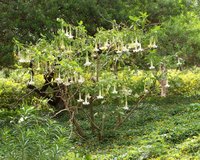 This is a large trumpet plant at the hotel. I thought this was unique, that it was so large, so I snapped a photo to show my father, who is a fan. Then when we got to Arusha I found that there were literally thousands of the plants around town, some of them twenty feet tall with hundreds of blooms. But I never got a picture of those so this one will have to do.
This is a large trumpet plant at the hotel. I thought this was unique, that it was so large, so I snapped a photo to show my father, who is a fan. Then when we got to Arusha I found that there were literally thousands of the plants around town, some of them twenty feet tall with hundreds of blooms. But I never got a picture of those so this one will have to do.
Safari Post I (Introduction)
Safari Post II (Nairobi)
Safari Post III (Arusha – The Safari Begins)
Safari Post IV - Lake Manyara A
Safari Post V - Lake Manyara B
Safari Post VI - Lake Manyara Lodge
Safari Post VII - Off to Serengeti!
 So we spent a couple nights at the Safari Park Hotel on the outskirts of town. It's a very nice place, although it is about a two hour drive from the airport at rush-hour in traffic that very nearly sits still the entire time. And oh, the aroma! Most of the traffic consists of these things that look like updated Volkswagen microbusses and spew exciting leaded diesel fumes.
So we spent a couple nights at the Safari Park Hotel on the outskirts of town. It's a very nice place, although it is about a two hour drive from the airport at rush-hour in traffic that very nearly sits still the entire time. And oh, the aroma! Most of the traffic consists of these things that look like updated Volkswagen microbusses and spew exciting leaded diesel fumes.  But the hotel was great. They had a terrific IThailian restaurant (Italian, but it sounded like the guy in the front office said "Thai" and we were all hungry for Thai the rest of the week), and a Japanese restaurant, and free breakfast with good tea, and a full hour massage for 1500 shillings--which is about $22. Not bad. And then there's this restaurant, the "African Barbecue" restaurant, where you can get dinner for $18 (including a bottle of wine!). What you get for that price is a salad, soup, and all the meat you can eat, to include goat, camel, and crocodile. The crocodile tastes like a whitefish filet with the consistency of a good ribeye. I couldn't get used to it and didn't eat much. The goat was excellent. The camel tasted wonderful but was chewy, like a clam strip. There were, of course, other meats, which were tasty, and a terrific (and extremely athletic) dance show. Without question this was the best thing we saw/did in Nairobi.
But the hotel was great. They had a terrific IThailian restaurant (Italian, but it sounded like the guy in the front office said "Thai" and we were all hungry for Thai the rest of the week), and a Japanese restaurant, and free breakfast with good tea, and a full hour massage for 1500 shillings--which is about $22. Not bad. And then there's this restaurant, the "African Barbecue" restaurant, where you can get dinner for $18 (including a bottle of wine!). What you get for that price is a salad, soup, and all the meat you can eat, to include goat, camel, and crocodile. The crocodile tastes like a whitefish filet with the consistency of a good ribeye. I couldn't get used to it and didn't eat much. The goat was excellent. The camel tasted wonderful but was chewy, like a clam strip. There were, of course, other meats, which were tasty, and a terrific (and extremely athletic) dance show. Without question this was the best thing we saw/did in Nairobi. It was rainy most of the day when we were there, but after the massages my friend and I decided we should take a dip in the hot tubs anyway. The water comes out of these little elephants. It's rather nifty. Unfortunately, as you'd expect in a place where the outside air temperature rarely gets above 85 or below 60, the outdoor "hot tub" is more of a "warmish tub," especially after half an hour of rain. There's also a waterslide out of shot to the left; the water temperature was between "Oh my God!" and "Holy @$#$!", but I went down the slide anyway. Twice. The trees with the yellow flowers are Thevetia peruviana, two of which live in pots on my porch. They aren't that big.
It was rainy most of the day when we were there, but after the massages my friend and I decided we should take a dip in the hot tubs anyway. The water comes out of these little elephants. It's rather nifty. Unfortunately, as you'd expect in a place where the outside air temperature rarely gets above 85 or below 60, the outdoor "hot tub" is more of a "warmish tub," especially after half an hour of rain. There's also a waterslide out of shot to the left; the water temperature was between "Oh my God!" and "Holy @$#$!", but I went down the slide anyway. Twice. The trees with the yellow flowers are Thevetia peruviana, two of which live in pots on my porch. They aren't that big. The morning we left it was raining, but I was able to snap this nice photo of a Bird of Paradise flower in the rain. The grounds also have several traveler's palms and bananas, both of which are related to the Bird of Paradise. Odd. Do not eat Bird of Paradise fruit.
The morning we left it was raining, but I was able to snap this nice photo of a Bird of Paradise flower in the rain. The grounds also have several traveler's palms and bananas, both of which are related to the Bird of Paradise. Odd. Do not eat Bird of Paradise fruit. This is a large trumpet plant at the hotel. I thought this was unique, that it was so large, so I snapped a photo to show my father, who is a fan. Then when we got to Arusha I found that there were literally thousands of the plants around town, some of them twenty feet tall with hundreds of blooms. But I never got a picture of those so this one will have to do.
This is a large trumpet plant at the hotel. I thought this was unique, that it was so large, so I snapped a photo to show my father, who is a fan. Then when we got to Arusha I found that there were literally thousands of the plants around town, some of them twenty feet tall with hundreds of blooms. But I never got a picture of those so this one will have to do.Safari Post I (Introduction)
Safari Post II (Nairobi)
Safari Post III (Arusha – The Safari Begins)
Safari Post IV - Lake Manyara A
Safari Post V - Lake Manyara B
Safari Post VI - Lake Manyara Lodge
Safari Post VII - Off to Serengeti!
11 December 2006
The first Safari Picture
Yes yes, I know, it's been like decades or something since I said I'd post safari pictures. Well, there were almost 600 of them. Give me time.
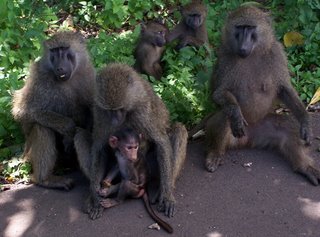
But to sate your apetite for photographs, I thought I'd post one. This picture is of the first animals we saw on safari, and they weren't even in the park. These fellows were hanging out on the roadside in the town of Mto wa Mbu, Tanzania (pronunce it Mitowahmboo and you'll be nearly correct; the name means "Village by the Mosquito River," in case you're wondering whether you want to honeymoon there or something). We saw more in the nearby Lake Manyara National Park, but these guys were special because... well, because they were first.
They're baboons, by the way, if for some reason you are unsure.
If you go to Mto wa Mbu: The place has the best bananas to be found anywhere on Earth. Buy a bunch on your way through town and enjoy them as a meal, pondering that with bananas like these it's easy to see why many poor folk in Uganda and Tanzania get more than 50% of their daily calories from the humble fruit.
Safari Post I (Introduction)
Safari Post II (Nairobi)
Safari Post III (Arusha – The Safari Begins)
Safari Post IV - Lake Manyara A
Safari Post V - Lake Manyara B
Safari Post VI - Lake Manyara Lodge
Safari Post VII - Off to Serengeti!

But to sate your apetite for photographs, I thought I'd post one. This picture is of the first animals we saw on safari, and they weren't even in the park. These fellows were hanging out on the roadside in the town of Mto wa Mbu, Tanzania (pronunce it Mitowahmboo and you'll be nearly correct; the name means "Village by the Mosquito River," in case you're wondering whether you want to honeymoon there or something). We saw more in the nearby Lake Manyara National Park, but these guys were special because... well, because they were first.
They're baboons, by the way, if for some reason you are unsure.
If you go to Mto wa Mbu: The place has the best bananas to be found anywhere on Earth. Buy a bunch on your way through town and enjoy them as a meal, pondering that with bananas like these it's easy to see why many poor folk in Uganda and Tanzania get more than 50% of their daily calories from the humble fruit.
Safari Post I (Introduction)
Safari Post II (Nairobi)
Safari Post III (Arusha – The Safari Begins)
Safari Post IV - Lake Manyara A
Safari Post V - Lake Manyara B
Safari Post VI - Lake Manyara Lodge
Safari Post VII - Off to Serengeti!
Ah.....
I paid off my car today.
Yaay!
I've never done that before. I wrecked the last one before I paid her off, and the one before that I didn't pay for, so it was no big deal. But this one...
It feels good. It'll feel better in a couple weeks when the title comes.
Yaay!
I've never done that before. I wrecked the last one before I paid her off, and the one before that I didn't pay for, so it was no big deal. But this one...
It feels good. It'll feel better in a couple weeks when the title comes.
06 December 2006
Home in Tampa
Well, I've returned to Tampa. It's nice to be home.
Apart from an extremely uncomfortable flight from JFK to Tampa and some bad gefilte fish on the flight out of Djibouti (which I'm only just now recovering from), it wasn't a bad trip. I even got to get out of the airport for a while in New York and walk around midtown Manhattan. Ah, New York is such a wonderful city. It was chilly, but not unbearably so. The city is all decked out for Christmas. I almost spent the money and went ice skating in Central Park, but it's been so many years since I tried that I think it could be dangerous.
It was in any event a glorious afternoon, but it took some getting used to that, even at one in the afternoon, the sun was at the same point in the sky as at 10 in the morning in Djibouti. I've forgotten how much more sun there is in the tropics. Sunset occured shortly before five (even here in Tampa it's before six, and the sun rises a lot later than it did in Djibouti).
There are safari pictures on the way. Soon. I promise. Just, don't hold your breath or anything.
Apart from an extremely uncomfortable flight from JFK to Tampa and some bad gefilte fish on the flight out of Djibouti (which I'm only just now recovering from), it wasn't a bad trip. I even got to get out of the airport for a while in New York and walk around midtown Manhattan. Ah, New York is such a wonderful city. It was chilly, but not unbearably so. The city is all decked out for Christmas. I almost spent the money and went ice skating in Central Park, but it's been so many years since I tried that I think it could be dangerous.
It was in any event a glorious afternoon, but it took some getting used to that, even at one in the afternoon, the sun was at the same point in the sky as at 10 in the morning in Djibouti. I've forgotten how much more sun there is in the tropics. Sunset occured shortly before five (even here in Tampa it's before six, and the sun rises a lot later than it did in Djibouti).
There are safari pictures on the way. Soon. I promise. Just, don't hold your breath or anything.
02 December 2006
Last Post In Djibouti
Well, I'm back, but there are so many safari pictures I've only just started going through them all. I haven't even opened Photoshop yet to shrink any of them so you'll just have to wait a few more days before you can see them. I know, I know, it sucks. I apologize.
I've been very busy since I got home so this will be the last post to come to you from Djibouti. Very soon I shall be home again and in Smittygirl's arms, and All will be Well. Yaay!
I've been very busy since I got home so this will be the last post to come to you from Djibouti. Very soon I shall be home again and in Smittygirl's arms, and All will be Well. Yaay!
Subscribe to:
Comments (Atom)